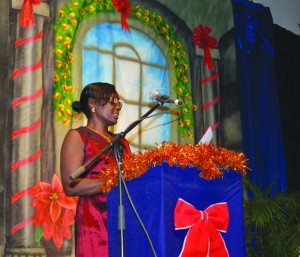
A capacity crowd, comprising officials, teachers, parents/guardians, students and members of the general public, have been given a wide-ranging report on the functioning of the Albena Lake-Hodge Comprehensive School over the past academic year. The occasion was Speech Night 2012 at which the school’s report was delivered by the Principal, Mrs. Ingrid Lake.
The report was presented as part of the programme which included various renditions in song and music by students and their band leaders, and the distribution of awards to students for outstanding academic and athletic performance. Students also received awards and certificates of recognition for music. Others wererecognised for their participation in the Regional Caribbean Schools’ Food & Nutrition Quiz, the 2012 Leeward Islands Debating Competition and the school’s Environmental Club.
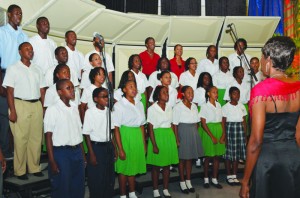
The Principal’s report gave a full account of the students’ performances in the CCSLC, CSEC and CAPE exams being offered by the Caribbean Examinations Council (CXC), the main examination board.
Two matters were among the issues which caught the attention of a number of keen listeners. One such matter, was an initiative of the school where students now have a five-year period during which to qualify for the CCSLC certificate. “This allowed us to enter students in Form Two for CCSLC Science for the first time, this academic year, rather than waiting until they were in Form Three,” the Principal reported. “Taking the exam in Form Two gave students the opportunity to display their knowledge while the information was fresh in their minds. Additionally, the students could focus on the CSEC programme and have more options available at the end of Third Form. The initiative was further supported by improved performance when compared with previous years.”
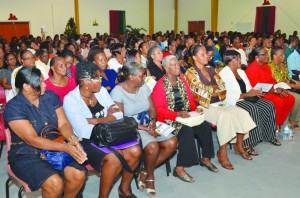
The second matter was a statement by the Principal who said that “the English B programme continues to frustrate both teachers and students.”
Mrs. Lake went on: “Both groups have argued against the relevance of the programme.As a result a concerted effort is continuously made by the Head of Department to explain the validity of the benefits associated with the pursuit of this course. Indeed, it is inconceivable that an English Department would further limit exposure to a subject that seeks to develop appreciation of a facility with the reception and production of the written word. English B provides students with the opportunity to explore masterful words created in the English Language. They are exposed to words and experiences different from their own. The result can only be enriching and they are continually encouraged to appreciate the subject for its benefits.
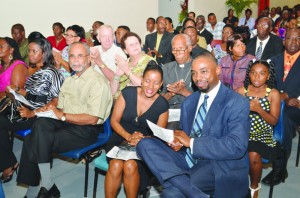
“Efforts will be made on all fronts to maintain and enhance the overall functioning of the Department particularly as regards student achievement. The Department members have endorsed the enhanced appreciation of English B as a five-year goal (2010-2015). Strategies will be developed and implemented to increase student enjoyment of this subject at all levels of the school.”
In order to further emphasise what the Principal said, it may be of interest to quote the following CXC statementregarding English B: “Students explore receptively and expressively three major literary modes: Drama, Poetry and Prose Fiction in order to become aware of the many functions and purposes of language. In doing so, they discover that the four facts of language arts, namely, listening, speaking, reading and writing, are closely linked together and are interdependent.
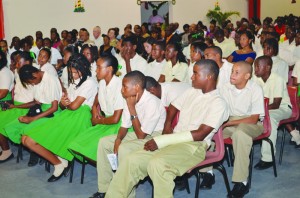
“Syllabus objectives are organised under understanding and expression in order to guide curriculum development, to give meaning to a teaching programme and to define an assessment scheme that reinforces an English syllabus which has been conceived as an integrated approach to language teaching and which enables students to appreciate the holistic nature of language learning.
“The English Syllabus is organised for examination as English A and English B. The former emphasises the development of oral and written language skills among students through a variety of strategies. The latter provides opportunities for students to explore and respond critically to specific literary texts as they observe and appreciate the author’s craft.”
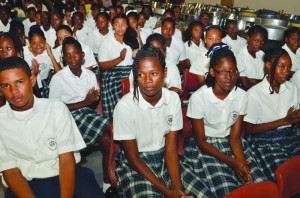
Mrs. Lake outlined a number of challenges being experienced at the school, and interspersed them with some of her comments as follows:
“Finding certification at levels appropriate to the ability level of those [students] who are not taking the CSEC examination: the offering of certification in vocational areas with CVO’s has not solved the problem because the requirements proved to be beyond those for whom we really need certification;
“Enabling teachers with the technology to deliver ICT enriched lessons; satisfying teachers’ request for resources as LCD projections; finding adequate space for the practical aspects of the Theatre Arts programme. The teacher, Mrs.Queeley-Javois, who has no proper base must be commended for her patience and ability to improvise; establishing computer labs with seating capacity for thirty students; increasing the number of computers to more frequently meet the needs of the students; slow response to maintenance/repair of computers. At present the maintenance of computersremains the sole responsibility of the Department of Information Technology and E-Commerce Services (Dites). Prompt attention was not given to service requests and that impeded productivity in ICT classes.”
Other challenges reported by the Principal were: “on-going electrical issues in Computer lab 1 hampered operations and raised safety concerns for those who must utilise the lab on a daily basis; the increasing use and sale of marijuana by boys and girls; the increasing misuse of the internet and other aspects of the social media; and lack of intrinsic motivation.”
In her conclusion, Mrs. Lake noted that 2011-2012 marked the 25th Anniversary of instituting comprehensive education at the secondary level. “Although much progress has been made, there is still much work to be done,” she observed. “We are disappointed that a significant percentage of our students are failing to maximise the opportunities provided for advancement through curricular and extra-curricular activities.
“The failure to recognise the importance of formal education is indirectly supported by erroneous concepts and incorrect parental priorities. Teachers will continue to exercise the discipline and determination required to encourage positive modification of attitudes and approaches. We will, however, need the assistance of parents/guardians who must increase their supervisory role especially at a time when the social media has captivated the interest of our children and consume their time and attention.”







